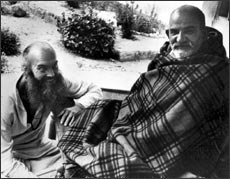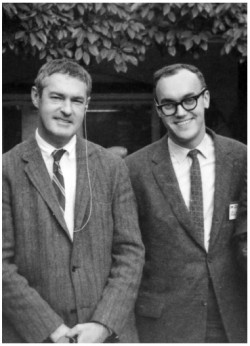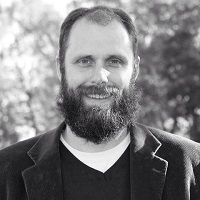“Aldous Huxley gave me a book…”
Not many people can start a story that way, but Ram Dass can.
Recently I had the opportunity, privilege, and honor to discuss love, fear, joy, intellectual pride, aging, and eternity with the famed pioneer of psychedelics, renowned spiritual teacher, and the author of more than a dozen books, including Be Here Now and Paths to God.
“I’ve always been an intellectual person,” I told Ram Dass. “And Buddhism has always been more than willing to satisfy that intellectual craving, but over the past couple of years I’ve found myself on occasion longing for something more intuitive. This longing has brought me to the door step of more faith based traditions, including your teachings.
But I cling to the intellect and the safety of knowledge, so the initial descent has not always been fun. Once I let go of my understanding and step into the mystery at the center of more intuitive teachings I find a greater degree of intimacy, but getting over that hump—letting go of the intellect and moving down into the heart—is difficult for me.
So what advice, if any, do you have for someone like me?” I asked.
“Well, as they say, the intellect is a good servant and a terrible master.” Rubbing his forehead, he continued, “The distinction is belief is up here, and down here in the heart is faith.” Most of the work I do is on planes of consciousness that are not physical; they’re not ‘thingy.’ So, I work with my imagination to get it going. The ego is who I think I am. The soul is who I really am. You move your identification from here to the soul which is not on this plane,” he said as his hand made the journey south from his head to his heart.
Those two words—“imagination” and “soul”—arouse both intellectual resistance and faith. Like I told Ram Dass, “For a lot of secular westerners those words have a dirty connotation, which is why many of those secular westerners, including myself, flock towards Buddhism.
As a Buddhist, talking about the soul and imagination in a positive context feels almost forbidden or taboo, but deep down it feels right,” I said. So, with a bit of childish mischief, I asked, “Can you talk more about the relationship between the imagination and the soul?”
 He answered my question with a story:
He answered my question with a story:
“Somebody once said to me, ‘You’re the guy who talks to his dead Guru.’ I said, ‘Yeah…’ ‘That’s only your imagination,’ he shot back. I told the guy, ‘Yeah! Maharaj-ji comes into my imagination.’”
I found myself laughing at this story, not because it was funny, but because I felt release, as if someone had given me permission to lighten up, to imagine.
“Most of the time the intellect has to be behind me,” he continued. “Vipassana {Buddhist meditation} was for me a foundation. It gave me one-pointedness. When I talk to my Guru I talk one-pointedly. That is how Buddhism helped me.”
“I’ve found recently that I am at odds with the neuro-physiologist, because they want it all right here,” Ram Dass said as he touched his head. “They want it all in the brain, and I just don’t see that at all. From my point of view, the soul directs the ego. You have a carriage, which is the body. Then there is the horse or our motivational systems. You also have a coachman up above that turns the carriage right or left. That is the ego. The soul is the person in the carriage. The soul says, ‘We’re going to go left here, I believe.’ When I was a psychologist my psychology revolved around the ego. When I experienced psychedelics there were other planes of consciousness that I suddenly became aware of, and I explored those planes of consciousness with psychedelics. Now I explore them with meditation, in singing, and with my Guru,” Ram Dass said with a smile. “I really enjoy the dualism that opens my heart,” he added.
Wait what?! Dualism?
“That is another dirty word in Buddhism,” I said.
“I know,” he shot back, laughing.
“Hmmm…that is interesting because there are Buddhist practices—vipassana, Zen, Satipatthana, and certain vajrayana practices—that bring me down into the body where awareness is less conceptual and more somatic. In fact, in that space I connect with the power and vastness I describe as God. So, could this ‘dualism’ be described as a theistic relationship,” I asked.
“It could…It could be described this way because it is me and God,” he said as he swept his hand across his entire field of vision. “It is me and God or me and Maharaj-ji, because for me Maharaj-ji is my door way to God. When I surrender—that is the key word—to Maharaj-ji it makes my life easy and satisfying because I let him take care of my life. I’m a puppet in his lila or his game. My life is not my life. It is his. Surrender, surrender, surrender…yeah.”
“Recently you released a new film entitled, Cultivating Intuitive Faith and True Surrender. I feel like surrender is the next frontier on my journey and it has come up a few times in our conversation, so let’s talk about surrender for a moment. Like I mentioned earlier, surrender is for me giving up the certainty of intellectual knowledge and giving into the heart, but it doesn’t come easy to me. I was excited about getting to talk with you because you’re a guy who got his under-grad from Tufts. The went on to Wesleyan for your masters and finally Stanford for your Ph.D. You ended up working side-by-side on the famous Harvard Psilocybin Project with Timothy Leary. So, you aren’t an anti-intellectual. The journey from the head to the heart seems to be symbolized in your biography by the transition from the learned intellectual Dr. Richard Alpert to Ram Dass. So what started this transition, this journey for you,” I asked.
 “I went from psychology to psychedelics, Ram Dass said as he started to recount his own journey. “The mushrooms showed me my inner-self. During that first mushroom trip I said, ‘I’m home…I’m home.’ It was something that psychology had never acknowledged. Well, maybe Jung…he was on this plane,” he added.
“I went from psychology to psychedelics, Ram Dass said as he started to recount his own journey. “The mushrooms showed me my inner-self. During that first mushroom trip I said, ‘I’m home…I’m home.’ It was something that psychology had never acknowledged. Well, maybe Jung…he was on this plane,” he added.
“Then I saw my friends going off to India. At that time Aldous Huxley gave me a book. He gave me the Tibetan Book of the Dead. That book explained these planes of consciousness. I said, if the Easterners know this much I’ve got to go, because we didn’t know that much. So I went to India.
I wanted someone to explain to me what I was missing. At that time, I was a Buddhist, but by chance I was delivered to a Hindu Guru {Neem Karoli Baba} He certainly had siddhis and that power impressed me, but his love took me by storm. I had never had unconditional love, and I felt that same feeling of I’m home…I’m home. His power opened the door, and when I tasted his love it made me loving.”
“Has the path of practice been about learning to love yourself unconditionally?” I asked.
”Yep. Yep. You get to that loving-awareness, but before you can love the universe or other people you have to be able to love your self. That love throws you into the next plane, which I call the soul plane.” While making air quotes, he said, “It is spiritual, but it also deals with separation, because the soul wants to meld with the One. The One is love, light; the One is peace, compassion. The soul wants to meld with that. The reason we are addicted to power is because of separateness—separate nations, separate states, separate religions, and separate people. When you are separate the whole universe is powerful, and you are so little…so little,” Ram Dass whispered. “When you get into your soul,” he continued, “the whole world is made of love—trees are made of love; beings, in their souls, are made of love.”
This is part one of two. Click here to read part two.
Love elephant and want to go steady?
Sign up for our (curated) daily and weekly newsletters!
Editor: Renée Picard
Photos: RamDass.org











Read 2 comments and reply